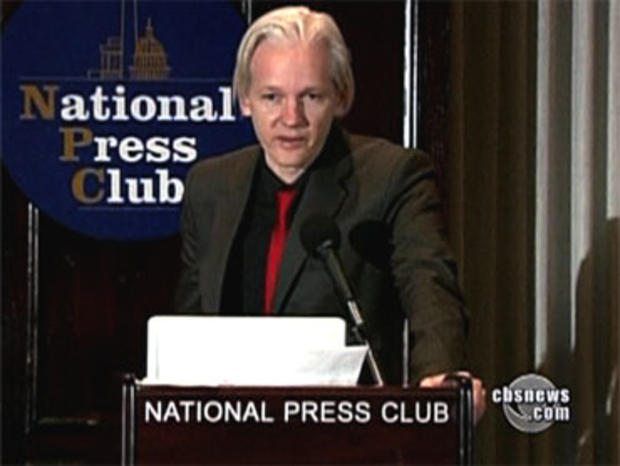Assange's Next WikiLeak Could Turn Him into a Robin Hood
WikiLeak's impresario Julian Assange has stirred up multiple hornet's nests with the release this year of intelligence documents on the Iraq and Afghanistan wars and, most recently, candid diplomatic cables that reveal the raw underbelly of U.S. international relations.
He has been painted as a villain by the U.S. government, and has defied requests to cease his document dumps. The Department of Justice is considering bringing charges against him, and he is becoming a man without a country.
While the revelations from the cables have caused some damage to the U.S. internationally, they are not among the most pressing concerns on Main Street America. Polls show U.S. citizens are far more outraged about the economy, jobs and taxes than body counts in Iraq, the locations of European nukes or U.S. diplomats' impressions of world leaders.
Assange's next act may turn him from nerdy villain to a Robin Hood figure, however, particularly with Main Street.
According to reports, Assange's next target is Wall Street. In a Forbes interview, he stated thatWikiLeaks' would unleash data from an existing American bank early next year. (There's a good chance it's Bank of America.) In the interview with Andy Greenberg, Assange stated that the documents "will give a true and representative insight into how banks behave at the executive level in a way that will stimulate investigations and reforms, I presume." He continued:
Usually when you get leaks at this level, it's about one particular case or one particular violation. For this, there's only one similar example. It's like the Enron emails. Why were these so valuable? When Enron collapsed, through court processes, thousands and thousands of emails came out that were internal, and it provided a window into how the whole company was managed. It was all the little decisions that supported the flagrant violations.
This will be like that. Yes, there will be some flagrant violations, unethical practices that will be revealed, but it will also be all the supporting decision-making structures and the internal executive ethos that cames out, and that's tremendously valuable. Like the Iraq War Logs, yes there were mass casualty incidents that were very newsworthy, but the great value is seeing the full spectrum of the war.
You could call it the ecosystem of corruption. But it's also all the regular decision making that turns a blind eye to and supports unethical practices: the oversight that's not done, the priorities of executives, how they think they're fulfilling their own self-interest. The way they talk about it.
As we saw in the aftermath of the financial collapse, U.S. bankers and Wall Street are not held in the highest esteem on Main Street. In a December 2009 interview on 60 Minutes, President Obama offered an assessment of Wall Street that seemed designed to resonate with average Americans: "I did not run for office to be helping out a bunch of fat cat bankers on Wall Street."
In a New York Times profile of J.P. Morgan CEO Jamie Dimon, author Roger Lowenstein wrote:
"America's five biggest banks, including Dimon's, now control 46 percent of all deposits, up from a mere 12 percent in the early '90s. Since the financial crisis, a sort of Jacksonian animosity toward big financial institutions has overtaken the public -- witness that, in the recent election, no fewer than 200 candidates spent money on ads attacking Wall Street. 'Big banks don't have a lot of friends right now,' says Nancy Bush, an analyst with NAB Research. 'Europe loves its big banks. America hates them.' "
Unlike the revelations revealing the inner workings and machinations of the U.S. military and government, a WikiLeaks document dump that sheds unflattering light on a U.S. bank amounts to feeding red meat to the lions of Main Street America. The documents may not reveal much more than what came out during the April 2010 financial reform hearingsin Washington, but Main Street is not in a particularly forgiving mood.
More on WikiLeaks
WikiLeaks Founder: Clinton Should Resign
Leaked Docs: Karzai Freed Connected Drug Dealers
WikiLeaks Sends U.S. Scrambling Over Security
Leaked Cables Reveal Locations of European Nukes
Hoekstra on WikiLeaks: "A Number of Time Bombs"
Outrage Over Wikileaks
The WikiLeaks Impact
WikiLeaks Releases State Dept. Documents
Key GOP Pol: WikiLeaks a Terrorist Group
Ahmadinejad Dismisses WikiLeaks Cable "Mischief"
U.S. Cables: Iran Armed Hezbollah Via Ambulances
Hoekstra: World's Trust in U.S. Now at Risk
U.S. Encouraged Diplomats to Spy, Leaks Show
Leaked Cables Shine Light on Iran Nuclear Threat
Worldwatch: Embarrassing Revelations Abound
Worldwatch: Diplomatic Shockers
White House Condemns WikiLeaks' Document Release
WikiLeaks Defies U.S., Releases Embassy Cables
Daniel Farber is editor-in-chief of CBSNews.com. You can read more of his posts in Hotsheet here. You can also follow him on Twitter.
